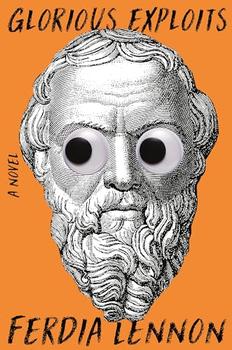Summary | Excerpt | Reviews | Beyond the Book | Readalikes | Genres & Themes | Author Bio

A Novel
by Ferdia Lennon
Aye, and that's exactly what we did.
* * *
FROM a distance, they look like so many red ants swarming on the rocks, though these Athenians hardly swarm. They just lie about or crouch or crawl about, looking for a bit of shade. Still, to be fair, my eyesight's not the best, and some of those most stationary may, in fact, be dead.
"Morning!"
A few glance up, but none return my greeting. Now, as time goes by, some in the city feel we've made a mistake. That keeping them here in the pits is too much, that it goes beyond war. They say we should just kill them, make them slaves, or send them home, but, ah, I like the pits. It reminds us that all things must change. I recall the Athenians as they were a year ago: their armour flashing like waves when the moon is upon them, their war cries that kept you up at night and set the dogs howling, and those ships, hundreds of ships gliding around our island, magnificent sharks ready to feast. The pits show us that nothing is permanent. That's what Diocles says. They show us that glory and power are shadows on a wall. Ah, and I like the way they smell. It's awful, but it's wonderful awful. They smell like victory and more. Every Syracusan feels it when they get that smell. Even the slaves feel it. Rich or poor, free or not, you get a whiff of those pits, and your life seems somehow richer than it did before, your blankets warmer, your food tastier. You're on the right track or at the very least a better track than those Athenians.
"Morning!"
A poor bastard sees my club and raises his arms. A stream of words follows, most of which I can't understand, his voice being a faint croak, but I pick out "Zeus," "please," and "children."
"Fear not," says I. "We come not to punish, though you Athenian dogs deserve punishment. Gelon and I are merciful. We come—"
"Shut up."
"What, Gelon? I speak the truth."
"Just be quiet."
I chuckle. "Ah, you're in one of those moods, I see."
He's already kneeling by the poor bastard, giving him water.
"Any Euripides?" says Gelon.
The man is sucking at the goatskin like it's Aphrodite's nipple, some of the water trickling down his beard. He's pink. Actually pink. Almost all of them are pink, though some are even red.
"Euripides, man, do you know any?"
The man nods and sucks some more. Other Athenians are coming forward now. Feet clanking with chains. There are more than I thought, though still fewer than last time.
"Water and cheese," says Gelon, "for anyone who knows lines of Euripides and can recite them! If it's from Medea or Telephus you'll get olives too."
"What about Sophocles?" asks a tiny creature with no teeth. "Oedipus Rex?"
"Fuck Sophocles! Did Gelon mention Sophocles? You—"
"Shut up."
"Ah, Gelon. I'm only saying."
Gelon starts with the terms.
"No Sophocles, nor Aeschylus, nor any other Athenian poet. You can recite them if it pleases you, but water and cheese are only for Euripides. Now, my man. What have you got?"
The man who was drinking clears his throat and goes to straighten up. It's a sorry sight. Try as he might, he can't do it. His neck flops, the head swaying from side to side, loose fruit blown by a gentle wind. He says:
"'Eh, but we must learn to understand, King Priam…'"
He stops.
"Is that all?"
"Sorry, I knew more, but I can't seem to … My head, it's broken, see, I forget faces, and I can't remember my … I swear I knew more."
The man puts his head in his hands. Gelon pats him on the shoulder and gives him one last sip. I think the Athenian's crying, but he still sucks away at the skin. Water pouring into him even as it pours out.
"Can anyone do better than that? A mouthful of olives for some Medea?"
Gelon's mad for Euripides. It's the main reason he comes. I think he would've been almost happy for the Athenians to have won if it meant Euripides would've popped over and put on some plays. He once spent a month's wages to pay an old actor to come to our factory and recite scenes while we shaped pots. The foreman said it was reducing productivity, and he threw the actor out. Gelon didn't give up, though. He had the actor shout the lines from across the street. You'd hear snatches of poetry through the blaze of the kiln, and though I think we made fewer pots that week, they were stranger, more beautiful. This was all before the war, and the actor's dead, the factory gone. I look over at Gelon now. His blue eyes wide and nervous. A block of cheese held over his head, shouting about olives. Gelon's just mad. Never mind Euripides.
Excerpted from Glorious Exploits by Ferdia Lennon. Copyright © 2024 by Ferdia Lennon. Excerpted by permission of Henry Holt and Company. All rights reserved. No part of this excerpt may be reproduced or reprinted without permission in writing from the publisher.




Wherever they burn books, in the end will also burn human beings.
Click Here to find out who said this, as well as discovering other famous literary quotes!
Your guide toexceptional books
BookBrowse seeks out and recommends the best in contemporary fiction and nonfiction—books that not only engage and entertain but also deepen our understanding of ourselves and the world around us.